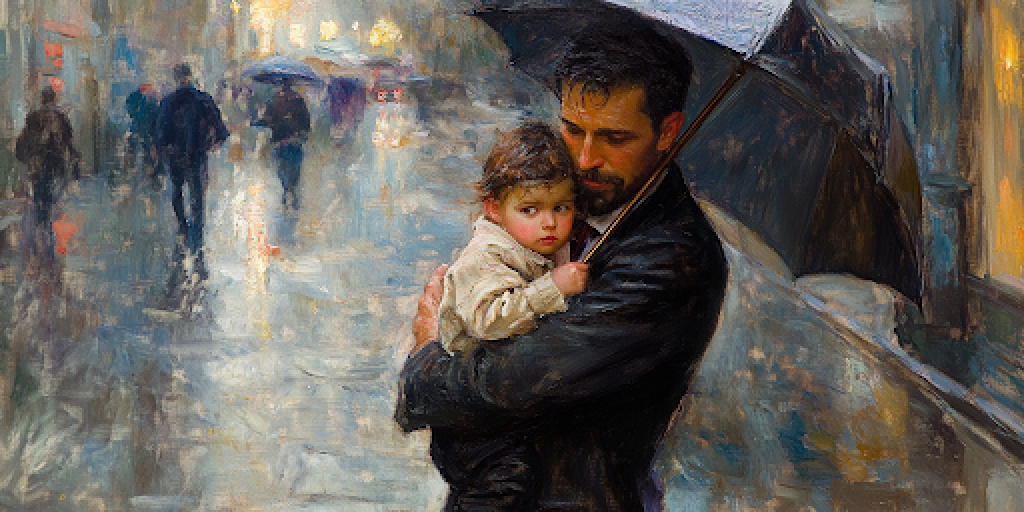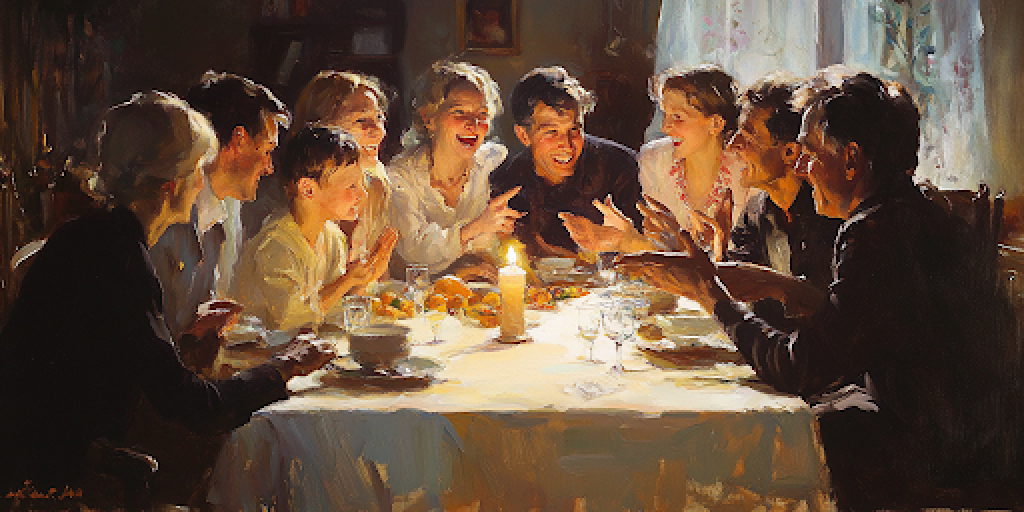I love the Book of Mormon account of Nephi’s vision of the Tree of Life. During Nephi’s amazing visionary experience, he was “caught away in the Spirit of the Lord” and saw the mother of Jesus, the Lamb of God, the rod of iron, the fountain of living waters, the tree of life, and highlights from Jesus’s ministry. Nephi also had a fascinating conversation with an angel about God’s love and Jesus Christ’s healing power. He wrote:
And the angel said unto me: Behold the Lamb of God, yea, even the Son of the Eternal Father! Knowest thou the meaning of the tree which thy father saw?
And I answered him, saying: Yea, it is the love of God, which sheddeth itself abroad in the hearts of the children of men; wherefore, it is the most desirable above all things.
And he spake unto me, saying: Yea, and the most joyous to the soul.
And after he had said these words, he said unto me: Look! And I looked, and I beheld the Son of God going forth among the children of men . . .
. . . And I beheld multitudes of people who were sick, and who were afflicted with all manner of diseases, and with devils and unclean spirits . . . And they were healed by the power of the Lamb of God [emphasis added].
There is much I do not understand about the love of God and Jesus Christ, but I gained a testimony as a young man that it is real. Motivated by this testimony, I sought during my career as a psychologist to gain greater insight into how their love can help people heal from mental illness. My testimony of their love has also helped me endure difficult questions, much uncertainty, and many other challenges to my faith during my life.
The Crucible of Mental Illness
I was ten years old when I found out my dad was mentally ill. To the best of my recollection, it was a snowy, freezing winter night in our small prairie town of High River, Alberta. Mom was sitting on the edge of my bed, looking concerned. I had pulled the quilt on my bed to my chin, trying to keep warm. I don’t remember all of the details, but I still vividly remember my fear and grief.
“Why doesn’t Dad ever come to my hockey games, Mom?” I asked, looking at her, trying to hold back tears.
“The doctors say your dad’s had a nervous breakdown,” Mom said.
“What’s that?” I asked.
“Your dad feels sad most of the time,” Mom explained. “He’s tired and has trouble thinking. He doesn’t feel good enough to go to work, church, or even to your hockey games. It’s a mental illness, not a physical sickness.”
“Can’t the doctors help him?”
“They’re trying,” Mom said. “They gave him some medicine, but it hasn’t helped much. Next week, your dad’s going to the hospital, and the doctors will try electroshock therapy.” My eyes widened in alarm.
Mom patted my hand, trying to reassure me. “I know it sounds scary, but it’s not as bad as it sounds. They’re going to put your dad to sleep and hook electrodes to his head. They’ll deliver an electric current to his brain while he’s asleep. He won’t feel or remember it.”
“What if it doesn’t help?”
“I don’t know, Scott.”
“He’s got to get better,” I whispered, fighting off the panic.
But Dad didn’t get better. After he returned from the hospital, our family settled into a painful routine defined by Dad’s emotional absence. Almost every day, when I arrived home from school, I found him in his recliner chair in the living room reading the scriptures or asleep. If he wasn’t in the recliner chair, he was upstairs in his bedroom, sleeping. Dad rarely went to work or church. He never again went fishing with me. He never again came to watch my hockey or baseball games.
As a young boy and later during my teenage years, I felt frustration, anger, and grief that nobody was able to help my dad. Religious explanations and solutions to Dad’s depression were insufficient, although friendships with members of our small Latter-day Saint branch in High River were a source of comfort and happiness to our family. The assistance Dad and Mom sought from psychiatric and psychological professionals also failed to cure him. Dad’s depression undermined my sense of worth and goodness and raised many difficult questions for me about religion and psychology. During my adolescent and high school years, I struggled academically, emotionally, and spiritually. I survived Dad’s absence by playing ice hockey and baseball and socializing with my friends, most of whom were not church members.
I graduated from high school when I was 16, and later that fall, enrolled in biology, chemistry, and evolutionary theory classes at the University of Calgary. Atheistic assumptions pervaded the content of these classes. As the semester progressed, my doubts about God’s existence increased. My attendance at church and religious involvement declined. My interest in learning also declined, and class attendance became increasingly infrequent. Not surprisingly, my grades suffered (0.50 GPA).

After this disastrous semester, my older sister, Vicki, convinced me to transfer to Ricks College in Rexburg, Idaho. Leaving the country and starting over with a fresh start seemed like the best solution for my academic problems. Ricks College was a positive change for me in many ways. There wasn’t much to do in Rexburg besides attending classes and church, so my grades improved. I also made some Latter-day Saint friends; however, I continued to struggle with loneliness, low self-esteem, depression, and religious doubts. Dad was still struggling with severe depression, and I continued to feel his absence in my life.
Experiencing Divine Love
One cold February evening during my third semester at Ricks College, I left my apartment and walked to the east side of Rexburg to a snow-covered field where I could be alone to think and pray. I knew that I needed help if I was going to overcome my depression and feel better about myself. After I had prayed for about an hour and was about to give up, I was blessed with a beautiful, healing experience. I felt encircled by light, love, and comfort. Peace and joy flooded over me. It was powerful and unlike anything I’d ever experienced. I basked in the healing warmth of the light and love for about an hour, even though it was a cold winter night. I received a powerful assurance that God loved me, believed in my goodness, and that changing my life and doing His will more fully would bring me happiness and joy.
After this, I walked through the snowy streets of Rexburg back to my apartment. As I stepped through the door and closed it behind me, my returned missionary roommate, Fred, who was sitting on the couch in our small living room, glanced up at me. He looked surprised and said, “Scott, you had a special experience tonight, didn’t you?”
It was my turn to be surprised, and I said, “Yes, I did, Fred. How did you know?”
“I can see it in your countenance,” he said. “You’re radiating light and love. I can see it and feel it.”
My life changed after this experience. It didn’t happen overnight, but my depression gradually lifted, and I gained greater self-worth and faith in my own goodness and potential. My sense of life purpose and direction grew as the months passed. Turning to God and Christ and feeling their divine love, rather than abandoning my hope in their existence, strengthened me emotionally and spiritually and helped set me on a healthier path.
I like how Truman Madsen described the healing power of God’s love. It resonates with my experience on that cold winter night in Rexburg.
Love is Fire. That is the great secret. It is Fire with a large F. It is Divine Fire. When it is in you it lights you, all of you. And transforms. No self-induced flicker can compare with it. . . [God’s] flame burns and encircles, reaching the self at its core, its spiritual center, and then moving outward to physical fingers and toes.
My Dad’s Survival and Eventual Recovery
After completing two years of college, I interrupted my studies to serve a mission for the Church in British Columbia, Canada. During my mission, I learned that Dad was beginning to recover from his depression. While I was still serving, he sent me a letter, told me about his progress, and shared his testimony of the Savior.
It thrills me that after 2000 years, His birth is remembered and the story retold by so many people in so many different countries. I think that in itself is a testimony of His Divinity. No other life has had that impact upon the world. Aside from His greatest work as the Redeemer, He has also literally changed the secular history of the world. In closing, I would like to assure you that you do serve the Savior of the world. I received that testimony by the spirit many years ago and many different times. It was so strong that it stayed with me through all the bad years and helped to sustain me.
After I returned from my mission, Dad told me that his testimony kept him from committing suicide during the many years of his depression. He said, “I promised Heavenly Father and the Savior that I wouldn’t do it.” His testimony that God and Christ loved him kept him alive and made his eventual recovery possible. The medications and psychological counseling he experienced also helped Dad to some degree. He said the counseling helped him see that his perfectionistic thinking and unrealistically high expectations contributed to his feelings of inadequacy, discouragement, and depression. Dad said the counseling also helped him learn to be kinder and gentler to himself and to be more careful about his thinking patterns and self-talk.
Spiritual Experiences During My Mission
During my mission, I was blessed with additional experiences with God and Christ’s love. One of these experiences, which profoundly influenced my future career, occurred on an afternoon in late 1976. My companion and I were in our missionary apartment in North Vancouver and found ourselves with time between appointments to read. I noticed the Ensign magazine had published a talk Elder Neal A. Maxwell had given at BYU titled, Some Thoughts on the Gospel and the Behavioral Sciences. In the talk, Elder Maxwell encouraged Latter-day Saint behavioral scientists to “become more of a link and bridge between revealed truth and the world of scholarship.” As I read and reflected on Elder Maxwell’s words, I felt warmth and love flood over me. I received a strong impression and witness that I should go into psychology for my profession and seek to build bridges between the gospel and the behavioral sciences. This surprised me because, at the time, I had not been seeking guidance about my future career plans. However, the impression was strong and clarified counsel I had received in my patriarchal blessing at the age of 14 that I should “work in scientific fields” and do research work “for the good of the people.”
Conflicts Between My Faith and Psychology
After completing my mission, I returned to Ricks College for one semester, married, and worked for a year to save money to continue my education. In September 1979, I started classes at Brigham Young University, majoring in psychology. I naively assumed that most faculty and students at BYU would share my interests in integrating gospel perspectives and values with psychology, but I was wrong. I quickly realized that many professors and students were reluctant to discuss the possible interface between psychology and religion. One professor and several students gave me hostile stares and silent treatment one day when I commented during class that deterministic views of behaviorism seemed to conflict with gospel teachings about moral agency. Another well-meaning professor encouraged me to drop my interest in integrating religion and psychology, saying, “There’s no future in it.”
My first bishop at BYU, Jonathan M. Chamberlain, was a psychologist. One day, while talking with me and my friend, who was also majoring in psychology, Jonathan said, “Ours is a dangerous profession.” He then shared his views about the spiritual and moral challenges he anticipated we would face during our careers. I didn’t feel alarmed by his warning, not realizing how powerful the challenges would be during the next several decades.
Because of my dad’s mental illness and the things he shared with me about the mental health professionals who treated him, I already knew there was an anti-religious bias in mainstream psychology. Sigmund Freud, the father of modern-day psychiatry and clinical psychology, believed that Western civilization would be better off if it gave up its neurotic need for religious “illusions” and replaced them with “the rational operation of the intellect.” Other early psychology leaders, such as John B. Watson, B.F. Skinner, Albert Bandura, and Carl Rogers either ignored or portrayed religious beliefs and behaviors in pejorative ways. They, like Freud, placed their faith in atheistic naturalism, which assumes that the universe can be explained without any appeal to God or intelligent design. Atheistic naturalism also embraces other assumptions about reality that dramatically conflict with the theistic worldview and Latter-day Saint doctrine.
Not all prominent behavioral scientists had negative views of religion, of course. Some, such as William James, Carl Jung, Gordon Allport, and Victor Frankl, wrote openly and positively about religion. However, their writings did not significantly alter the anti-religious climate in mainstream psychology, which was still pervasive when I began my education at BYU. In 1979, in an interview published in the APA Monitor, Robert Hogan, a professor at Johns Hopkins University, vividly and accurately portrayed the zeitgeist of mainstream psychology at that time when he said: “Religion is the most important social force in the history of man. . . . But in psychology, anyone who gets involved in or tries to talk in an analytic, careful way about religion is immediately branded a meathead; a mystic; an intuitive, touchy-feely sort of moron.”
But change was in the air. In early 1980, one of the world’s most prestigious psychology journals published an article titled Psychotherapy and Religious Values. The author, Allen E. Bergin, a professor at BYU and internationally renowned psychotherapy researcher, confronted mainstream psychologists’ anti-religious biases and asserted that theistic perspectives are needed in mainstream psychology. Allen’s article shocked many psychologists—inspired many others—and catalyzed an international movement to integrate spiritual perspectives into psychology and psychotherapy. As a student at BYU at the time, I found myself on the front lines of this movement.
Building Bridges Between Religion and Psychology
Several months before the publication of his landmark article, Allen was a guest speaker in one of my classes and presented about it. I was thrilled that a professor of Allen’s stature had written such a courageous article. Shortly thereafter, I volunteered to work on his research team and assist with a meta-analysis literature review on religion and mental health. I also helped Allen with a data-based study about religion and mental health in several samples of BYU students.
While a Ph.D. student at the University of Minnesota, I stayed in contact with Allen, who provided encouragement and support. When I encountered career-threatening religious bias from a professor in my doctoral program, Allen’s support was crucial. Although the biases were usually not overt, they were real, powerful, and at times threatening, especially for graduate students and early-career psychologists. On one occasion, Allen told me we needed to “establish a beachhead” so that future mental health professionals wouldn’t have to fight the same battles. And at times, it felt like we were fighting a war—a war over ideologies and power.
Challenging the assumptions and biases of atheistic naturalism, of course, did not involve a war with guns and bombs, but those fighting to create safety and intellectual space for theistic perspectives in mainstream psychology risked their degrees, jobs, grants, reputations, and careers. As a doctoral student, and after my graduation, I experienced prejudice and discrimination many times both because of my interest in integrating psychology and religion and because I was a Latter-day Saint.
During my Ph.D. program, I also experienced a tragedy when my beloved mother was killed in a car accident. My grief about Mom’s death, combined with the anxiety and stress I was experiencing in my professional training, motivated me to seek psychotherapy to cope with my pain. Although I told my psychotherapist during the first session that I thought two or three months of therapy would be sufficient to solve my problems, I stayed in treatment for 18 months. During that time, I worked through my grief about Mom’s death, explored the pain I still felt over Dad’s absence during my adolescence, and found more profound healing in my relationship with him. I also talked about some of my religious doubts and unhealthy, perfectionistic ways of understanding and living my religion. My therapy experience strengthened my confidence that both psychology and religion have much to offer those who are struggling with emotional and spiritual difficulties.
Despite the professional and personal challenges I experienced during my Ph.D. program, I graduated with my Ph.D. in 1988 and was offered a faculty position at Central Washington University. Two years later, I accepted a position at BYU. During the 1990s, Allen and I wrote and edited some articles and books about spirituality, mental health, and psychotherapy. Our research, and the research of many colleagues worldwide during the past few decades, has provided overwhelming support for the mental health benefits of religious commitment and spiritual practices. Devoutly religious people of virtually all faith traditions tend to enjoy better psychological well-being and life satisfaction. In addition, during stressful times, people who engage in religious coping (e.g., praying, meditating, reading scriptures) tend to adjust better to crises and problems. People who turn to God for help in coping with stress also have lower levels of anxiety and depression.
The Healing Power of Divine Love
After Allen’s retirement, I collaborated more with two of my private practitioner colleagues, Michael Berrett and Randy Hardman. We specialized in treating women who were struggling with eating disorders, and we conducted research studies in our effort to understand better how faith and spirituality could help in treatment and recovery. Our research and clinical work revealed that most of our patients lost their sense of spiritual connection with God during the development of their eating disorder illness, even when that relationship had once been meaningful.

We found that during treatment, as patients re-established connections with God, they regained a positive spiritual identity, seeing themselves as creations of God with divine worth. They began to see God as loving and forgiving and rediscovered how to trust and interpret their spiritual intuitions and impressions. They also learned to give and receive love and experienced renewed purpose and meaning. They transitioned from external, materialistic measures of self-esteem (e.g., thinness) to valuing and living by internal spiritual principles (e.g., honesty, courage). Many sought and regained social support within their religious community after they completed inpatient treatment.
In one of our qualitative research studies, our patients told us how important their relationship with God was in their treatment and recovery and offered insights into how God’s love and the love of others helped them. Below are a few of their comments:
Having a relationship with God has changed my outlook on life. God wants me to be happy. I know that He loves me unconditionally. I have found out who I am and that I am of great worth.
There’s no way I would be where I am today without help from God. I honestly was so sick and confused and lost, and there’s just no way I could’ve picked myself up. I believe spirituality has given me added strength and insight I otherwise would not have had. It has also helped me to be more aware of the needs of others. Serving others has really furthered my recovery.
God has helped me directly by introducing very special people into my life when I needed them. These people helped me with their love, support, friendships, and examples. It was divinely orchestrated. He has introduced thoughts and ideas to me, letting me know He is there and cares.
God has always been there for me—I just shut and locked the door during my eating disorder. As I started treatment, when I still wouldn’t let Him in, God sent other people to help me heal. He provided me with my family and the staff at the treatment center. As I started to let them in—their love and support—I could see glimpses of God’s love for me. When I was ready and let Him in, He welcomed me. He pulled me from my own hell. I have no doubt now that He is very personally aware of and active in my life.
Divine Love as My Lodestar
In addition to the experiences I shared earlier, I have been blessed with many more experiences when I have felt God and Christ’s love for me. Some of my experiences with their love occurred when I was in church, some when I was in the temple, some when I was kneeling in prayer, some when I was serving others, and some when I was out in nature. Often, I was praying and pondering when I felt their love. I also felt their love through other people’s caring expressions and actions. I have also felt God and Christ’s providential care, protection, and inspiration—additional manifestations of their love. If we desire it and seek to live close to them, I believe we can feel God and Christ’s love often—and most importantly—during our times of greatest difficulty and need.
Steve Young recently shared many important insights about love in his books, “The Law of Love” and “The Law of Love in Action.” Like Steve, I have found that love—God and Christ’s love and the love of those seeking to emulate Jesus Christ’s love—has been the foundation of my faith and helped me endure and grow from the challenges in my spiritual journey. Steve wrote:
With the law of love as my guiding light, my steely foundation of faith, I can stare into the enormity of human foibles. From polygamy, racism, difficult issues in Church history, sexism, queerphobia, to anything else that can destabilize my relationship to the institutional Church, I can stare at it, chew on it, and own it. I can find the grace to manage through it without flinching. It can be devastatingly heavy and painful, but I can go back to the fundamental message of the Restoration, which is this: every single person on earth has a divine heritage from loving Heavenly Parents who knew us before. They have a plan for our growth on this earth; and Christ came to heal us and save us.
Divine love—the love of God and Jesus and the Christlike love of others—has been my lodestar and helped sustain my faith during painful and difficult life experiences. When I experienced severe illnesses and untimely deaths of family and friends, divine love comforted me in my grief and brought me hope for eventual healing and joyful reunions. When I encountered conflicts between my personal beliefs and church doctrines, policies, and history, divine love motivated me to seek understanding by searching the scriptures, the writings of modern prophets, and other faith-promoting writings, including those by scholars and researchers. When I experienced misuse of religious authority by clergy and professional jealousy, dishonesty, and backstabbing by Latter-day Saint colleagues, divine love motivated me to leave judgment to God and to forgive those who offended me. When I experienced the pain of family members and friends no longer fitting into the Latter-day Saint “ideal” (e.g., choosing divorce, choosing a different lifestyle, revoking church membership), divine love motivated me to continue loving them without reservation or judgment, and helped my love for them grow even stronger. When I recognized my pride, weaknesses, and sin, divine love motivated me to humble myself, repent, and express gratitude for the miracle of forgiveness made possible by the incomprehensible atonement of Jesus Christ.
After over four decades of research about religion and mental health and my lived experiences with religion in all of its complexity and contradictions, I believe that God and Christ’s love are beautiful, amazing realities. Turning to God and Christ with hope and faith can comfort, strengthen, and heal us emotionally and spiritually. Although I don’t “know the meaning of all things” and still have many unanswered questions, I have a testimony “that [God] loveth his children.” I have experienced that love and agree with Nephi and the angel that it is “the most desirable above all things” and “the most joyous to the soul.”
















